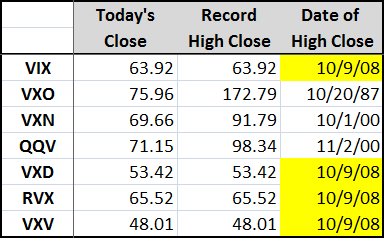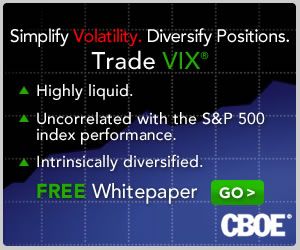New Record Close for Volatility Indices

Today’s dramatic last hour selloff resulted in new record high closes in four of the seven major U.S. volatility indices, including the VIX, which exceeded 60 for the first time and established a new record close of 63.92. In addition to the VIX, the VXD (CBOE DJIA Volatility Index) and the RVX (CBOE Russell 2000 Volatility Index) also set new records.
Note that these volatility indices have different life spans and data histories, so the comparisons of all-time record highs across indices are not always particularly relevant. For more information on all of the volatility indices, try Overview of U.S. Volatility Indices.


4 comments:
just about most traders' trade system are at record oversold if not very extremely oversold. but buying in had been a losing cause this past weeks as what's occurring is very likely the stock market is hinting something very bad is going to happen unlike the 1987 crash but Great Depression scenario. guess all those perm-bears (ex. pretcher) are vindicated.
Jimmy
For a nice comparison of volatility during the all the recent financial crisies back to 1990 and then back in 1929, see . . .
http://www.voxeu.org/index.php?q=node/2243
No historical reason to think we can't go a lot lower . . . keeping in mind that the snapper rally when it comes will be both unexpected and ferocious.
I can only imagine the short squeeze + reversal one of these days... the price swings that day will be massive.
The DJIA, S&P 500 and Nasdaq futures are down 282, 29 and 27 points this morning. Central world banks have intervented by pumping liquidity into the markets, the $700 billion U.S. financial package was approved, the U.S. interest rates were decreased by 0.5% and other measures were implemented by U.S., European and Asian financial institutions and regulatory bodies. What positive impact will the the Washington meeting of the finance ministers of the worlds industrialized nations have on the financial markets?
Post a Comment